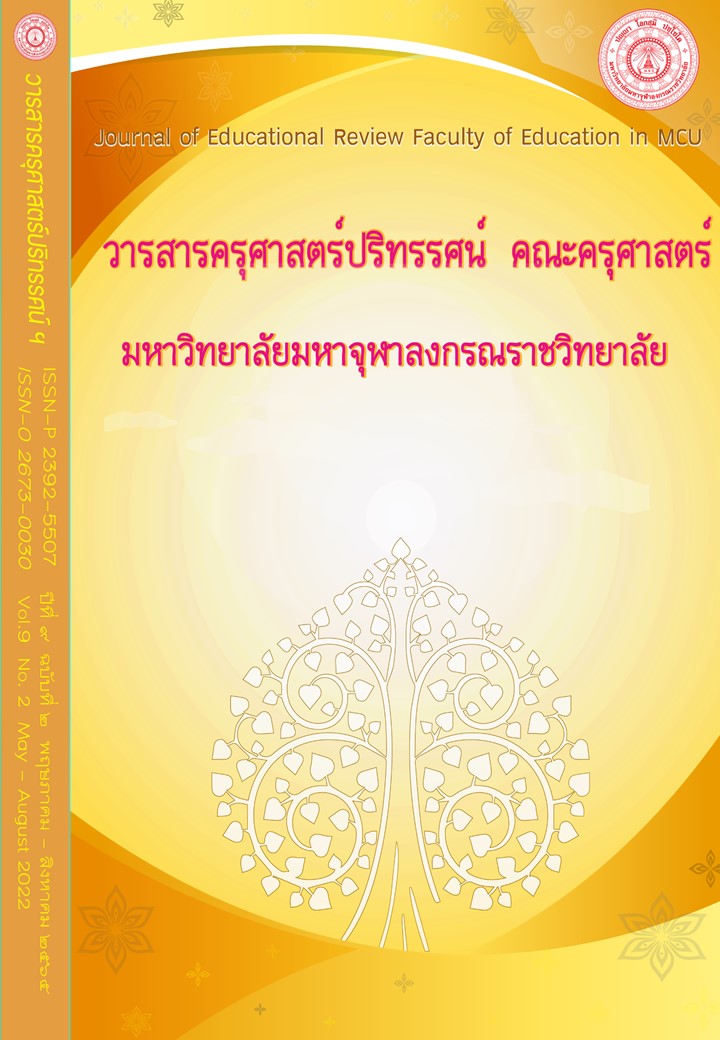PROCESS OF COACH DEVELOPMENT TOWARDS WAY OF LIFE FOLLOWING THE THREE WISDOM PRINCIPLE
Main Article Content
Abstract
The Process of developing a teacher coach is important to the development of education in the 21st century, which aims to develop learners to have knowledge, skills and desirable characteristics that can be used in a quality life by teachers of the new era who assume the role of teachers. A coach is a teacher who inspires through the use of powerful questions and reflections during coaching to enable learners to learn to their full potential. Therefore, the usefulness of this study is to bring the three wisdom principle which is Dharma in the development of wisdom so that human beings can gain real knowledge and understanding with cause and effect if teachers can apply the process of developing a coach with the three wisdom principle to integrate with the learning and practice of the coaching process of “The GROW Model”. The GROW Model consisting of 1) G-Goal, 2) R-Reality, 3) O-Options, and 4) W-Way Forward. This is an open are for the coach to take lessons from the process of developing their coaches. They reflected their thinking by using the three wisdom principle to development process, which are: Base 1: Suttamayapanya, listens to create wisdom; Base 2: Jintamayapanya, think analytically to create wisdom, and Base 3: Pawanamayapanya, to practice until wisdom arises. If the teacher have learned and applied the concept of the teacher-coach development process with the three bases of wisdom as a basis for self-development. Continuing until becoming a way of life of coaching both in one’s professional and life subjects.
Article Details

This work is licensed under a Creative Commons Attribution-NonCommercial-NoDerivatives 4.0 International License.
ทัศนะและความคิดเห็นที่ปรากฏในบทความในวารสารฉบับนี้ถือเป็นความรับผิดชอบของผู้เขียนบทความนั้นเพียงผู้เดียว และไม่ถือเป็นทัศนะและความรับผิดชอบของกองบรรณาธิการ
กองบรรณาธิการขอสงวนสิทธิ์ในการคัดเลือกบทความลงตีพิมพ์และจะแจ้งให้เจ้าของบทความทราบหลังจากผู้ประเมินบทความตรวจอ่านบทความแล้ว
ต้นฉบับที่ได้รับการตีพิมพ์ในวารสารครุศาสตร์ปริทรรศน์ คณะครุศาสตร์ มหาวิทยาลัยมหาจุฬาลงกรณราชวิทยาลัย ถือเป็นกรรมสิทธิ์ของคณะครุศาสตร์ มหาวิทยาลัยมหาจุฬาลงกรณราชวิทยาลัย ห้ามนำข้อความทั้งหมดหรือบางส่วนไปพิมพ์ซ้ำ เว้นเสียแต่ว่าจะได้รับอนุญาตจากมหาวิทยาลัยฯ เป็นลายลักษณ์อักษร
References
กระทรวงศึกษาธิการ. (2558). เอกสารแนวทางการจัดการเรียนรู้ในศตวรรษที่ 21. กรุงเทพมหานคร: โรงพิมพ์ชุมนุมสหกรณ์.
เกรียงศักดิ์ นิรัติพัฒนะศัย และคณะ. (2555). Untold Story of Executive Coaching in Thailand. กรุงเทพมหานคร: กรุงเทพธุรกิจ.
ขัตพันธ์ ชุมนุสนธิ์. (2565). โค้ช...ศาสตร์แห่งการพัฒนาคนอย่างแยบยล. แหล่งที่มา http://www.smart coachthailand.com/what-is-coaching สืบค้นเมื่อ 11 ก.พ. 2565.
จำรัส อินทลาภาพร. (2561). การโค้ชเพื่อเสริมสร้างทักษะการพัฒนาหลักสูตรสถานศึกษาของนักศึกษาวิชาชีพครู. วารสารวิจัยและพัฒนาหลักสูตร. 8 (1). 260-268.
ดวงทิพย์ สวัสดีจันทร์. (2556). ความสัมพันธ์ระหว่างพฤติกรรมการโค้ชกับความสำเร็จในการแข่งขันของ นักกีฬาเทควันโดหญิงในการแข่งขันกีฬาแห่งชาติครั้งที่ 42. วิทยานิพนธ์วิทยาศาสตรมหาบัณฑิต. จุฬาลงกรณ์มหาวิทยาลัย.
ทองย้อย แสงสินชัย. (2557). บาลีวันละคำ. กรุงเทพมหานคร: นานมีบุ๊คส์พับลิเคชั่น.
ป. หลงสมบุญ. (2560). พจนานุกรม มศธ-ไทย. กรุงเทพมหานคร: สำนักพิมพ์บรรณาคาร.
ประหยัด พิมพา. (2561). การศึกษาไทยในปัจจุบัน. วารสารมหาวิทยาลัยมหามกุฏราชวิทยาลัย วิทยาเขตร้อยเอ็ด. 7(1). 242-249.
พนิดา จารย์อุปการะ. (2557). รูปแบบการพัฒนาวิชาชีพเพื่อเสริมสร้างสมรรถนะการโค้ชของครูหัวหน้ากลุ่มสาระการเรียนรู้. ดุษฎีนิพนธ์ปรัชญาดุษฎีบัณฑิต. มหาวิทยาลัยศิลปากร.
พระธรรมปิฎก (ป. อ. ปยุตโต). (2545). หลักแม่บทของการพัฒนาตน. พิมพ์ครั้งที่ 13. นครปฐม: ผลิธัมม์.
สมเด็จพระพุทธโฆษาจารย์ (ป. อ. ปยุตโต). (2559). พจนานุกรมพุทธศาสน์ ฉบับประมวลธรรม. กรุงเทพมหานคร: ผลิธัมม์.
สุชัชวีร์ สุวรรณสวัสดิ์. (2562). สจล. เปิด 3 บทบาทใหม่ครูยุคอัลฟ่า รับวันครูแห่งชาติ 2562. แหล่งที่มา https://www.prachachat.net/education/news-278682 สืบค้นเมื่อ 11 ก.พ. 2565.
Joyce, B. and Showers, B. (1982). The coaching of teaching. Educational Leadership. 40(2). 4-10.
Lasley M., Kellogg, V., Michaels R., & Brown S. (2015). Coaching for transformation: pathways to ignite personal & social change. 2nd edition. Pennsylvania: Discover Press.
Patti, J. Hoizer, A., Stern, R. and Brackett, M.A. (2012). Personal, professional coaching: Transforming professional development for teacher and administrative leaders. Journal of Leadership Education. 11(1). 263-274.
University of California. (2013). The coaching toolkit for child welfare practice. Davis: University of California.


